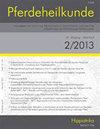Ceterizine治疗季节性摇头马的随机双盲安慰剂对照临床试验
IF 0.3
4区 农林科学
Q4 VETERINARY SCIENCES
引用次数: 1
摘要
摇头是对受影响马匹福利的一种威胁。由于季节性摇头可能由过敏引起,本临床试验研究了第二代抗组胺药西替利嗪是否能减少摇头。目的是评估西替利嗪与安慰剂治疗季节性摇头的临床效果。假设它会使50%的马减少50%的摇头。根据主人的信息和一般的临床检查,选择了30匹季节性摇头的客户拥有的马。在这项交叉随机双盲安慰剂对照临床试验中,马按随机顺序服用西替利嗪(0.4mg/kg,每天两次,持续7天)或安慰剂(相同数量的药片,每天两次,持续7天),其间有1周的洗脱期。在治疗开始和治疗两周后,用视频记录了9分钟的弓箭步方案,在这9分钟内,由两名评估员以盲法对摇头次数进行评分。分析了29匹马的数据。其中10匹马服用西替利嗪后,摇头次数减少了50%以上,8匹马服用安慰剂后,摇头次数减少了50%以上。差异无统计学意义(p=0.73)。在考虑天气条件的混合线性模型中,也没有发现显著的处理效果。结论:西替利嗪对本研究马的季节性摇头无显著影响。本文章由计算机程序翻译,如有差异,请以英文原文为准。
A randomized double blind placebo-controlled clinical trial of Ceterizine in horses affected by seasonal headshaking
Headshaking is a threat to the welfare of affected horses. As seasonal headshaking may be triggered by allergic conditions, this clinical trial investigated whether the second-generation antihistamine cetirizine decreased headshaking. The objective was to assess the clinical effect of cetirizine versus placebo on seasonal headshaking. The hypothesis was that it would reduce headshaking by 50% in 50% of the horses. Thirty client-owned horses with seasonal headshaking were selected on the basis of information from the owner and a general clinical examination. In this crossover randomised double-blind placebo-controlled clinical trial, horses were given cetirizine (0.4mg/kg twice daily PO for 7 days) or placebo (same number of tablets twice daily PO for 7 days) in a randomised order, with a washout period of 1 week in between. A 9-minute lunge protocol was recorded on video at the start and after both treatment weeks, and the number of headshakes in this 9-minute period was scored by two assessors in a blinded manner. Data of 29 horses were analysed. The number of headshakes decreased by more than 50% in 10 horses when they were given cetirizine and in 8 horses when they were given placebo. This difference was not significant (p=0.73). In a mixed linear model incorporating weather conditions no significant treatment effect was found either. In conclusion: no significant effect of cetirizine on seasonal headshaking was found in the group of horses included in this study.
求助全文
通过发布文献求助,成功后即可免费获取论文全文。
去求助
来源期刊

Pferdeheilkunde
农林科学-兽医学
CiteScore
0.40
自引率
33.30%
发文量
20
审稿时长
18-36 weeks
期刊介绍:
Since 1985, Pferdeheilkunde – Equine Medicine publishes scientific articles from all fields of equine medicine in German and English language as well as abstracts of the international professional literature. The journal appears bimonthly.
 求助内容:
求助内容: 应助结果提醒方式:
应助结果提醒方式:


